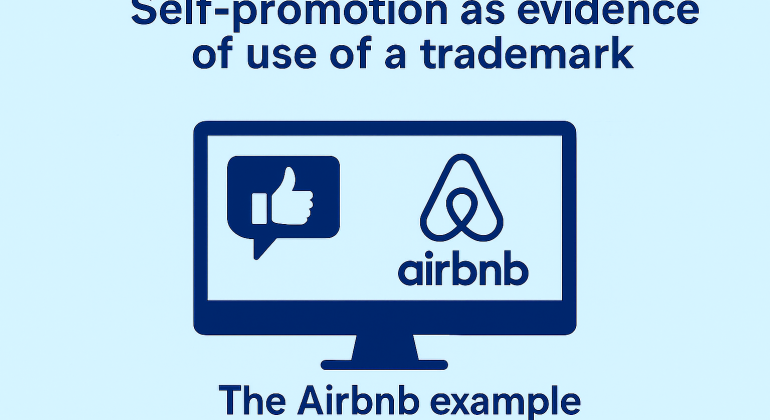Sommaire
Introduction
On May 21, 2025, the General Court of the European Union upheld the partial revocation of the EU trademark Airbnb for “advertising” services in class 35.
This decision highlights an essential distinction: promoting one’s own services does not constitute advertising within the meaning of trademark law.
The case illustrates the importance of genuine and distinctive use of registered trademarks and encourages proprietors to adapt their filing strategies to the actual nature of their business activities.
The partial revocation request concerning the Airbnb trademark
Airbnb, Inc., which owns a European Union trademark since 2013 and which covers advertising services in class 35, was subject to a revocation request filed in 2020 by the Australian company Airtasker Pty Ltd on the grounds of lack of genuine use within the European Union.
The EUIPO Cancellation Division partially upheld the request for revocation.
Following an appeal filed by Airbnb, the EUIPO Board of Appeal confirmed the revocation for class 35, finding that the evidence provided (promotional materials, marketing campaigns, website excerpts) related exclusively to the company’s internal activities and not to the provision of advertising services to third parties.
Airbnb then appealed to the General Court of the European Union, challenging the interpretation that advertising must necessarily be understood as a service provided to third parties.
The position of the General Court of the European Union
The General Court dismissed Airbnb’s appeal and upheld the partial revocation of the trademark for advertising services.
Based on established case law, the Court recalls that advertising services are intended to assist other companies in promoting their goods or services, or to strengthen their competitive position on the market through commercial communication.
Thus, advertising carried out solely for one’s own internal purposes, even if extensive and widely disseminated, cannot be regarded as an advertising service provided to third parties, which is the type of service covered by Class 35 under the Nice Classification.
The evidence of use submitted by Airbnb demonstrated only the promotion of its own accommodation offers and commercial activities, without establishing any advertising services carried out on behalf of other companies or individuals.
The Court further specified that promoting the accommodation offered by hosts on the platform does not constitute an independent advertising activity.
Such promotion is primarily intended to increase the visibility and profitability of the platform itself, rather than to provide a distinct advertising service.
The use of the Airbnb trademark in this context cannot therefore be regarded as genuine use for advertising services.
Key takeaways for trademark owners
This decision reiterates a fundamental rule of trademark law: for use to qualify as genuine, it must correspond to the precise nature of the services designated.
- Avoid unnecessarily overprotecting a trademark
Filing a mark in classes that have no direct connection with the owner’s actual business activities, as was the case here with Class 35 for advertising services, exposes the registration to medium-term risks of revocation
- Promoting one’s own products does not constitute an advertising service
A company’s internal or self-focused communication, even on a large scale, is not sufficient to demonstrate genuine use for advertising services. Only services rendered to third parties (e.g., agencies, consultants, platforms providing visibility to others) fall within this category.
- The importance of a coherent filing strategy
Before filing, it is essential to identify accurately the relevant classes in light of the proprietor’s real economic activities. For digital businesses in particular, distinguishing between core activities and ancillary services is crucial.
Conclusion
In its judgment of May 21, 2025 (Case T-1032/23, Airbnb, Inc. v. EUIPO), the General Court of the European Union clearly reiterates that genuine use of a trademark requires exploitation consistent with the services for which it has been registered.
Trademark owners must therefore ensure that their filings accurately reflect the nature of their services, otherwise, they risk partial or even total revocation of their rights.
Dreyfus & Associés assists its clients in managing complex intellectual property cases, offering personalized advice and comprehensive operational support for the complete protection of intellectual property.
Nathalie Dreyfus with the support of the entire Dreyfus team
Q&A
1. What types of services are covered under Class 35?
Class 35 of the Nice Classification covers advertising, business management, and retail services, among others.
2. Why is it risky to register a trademark in classes that do not correspond to the owner’s actual business activities ?
Overly broad filings increase the risk of revocation: if the proprietor cannot demonstrate genuine use in a given class, their rights may be partially or fully cancelled. Moreover, an incoherent filing strategy can trigger unnecessary disputes and raise the overall cost of maintaining the trademark portfolio.
3. Can an overly narrow trademark filing also create issues?
Yes. An excessively limited specification may prevent a business from achieving adequate protection as its activities evolve. A trademark should be protected in a proportionate manner: if the filing is too broad, it risks revocation; if too narrow, it may fail to shield the owner from imitators
4. How can a business anticipate and mitigate the risk of revocation within its trademark portfolio?
By implementing regular monitoring of actual use, maintaining dated evidence, conducting internal audits every two to three years, and adjusting filings when business activities evolve. This proactive approach helps prevent future challenges.
5. What types of evidence are generally accepted to prove genuine use of a trademark within the European Union?
The evidence must demonstrate real, public, outward-facing, and commercial use of the mark for the goods or services for which it is registered. This may include invoices, contracts, advertisements directed at the public, sales evidence, marketing materials, audience metrics, or commercial partnerships. Purely internal documents are insufficient.


